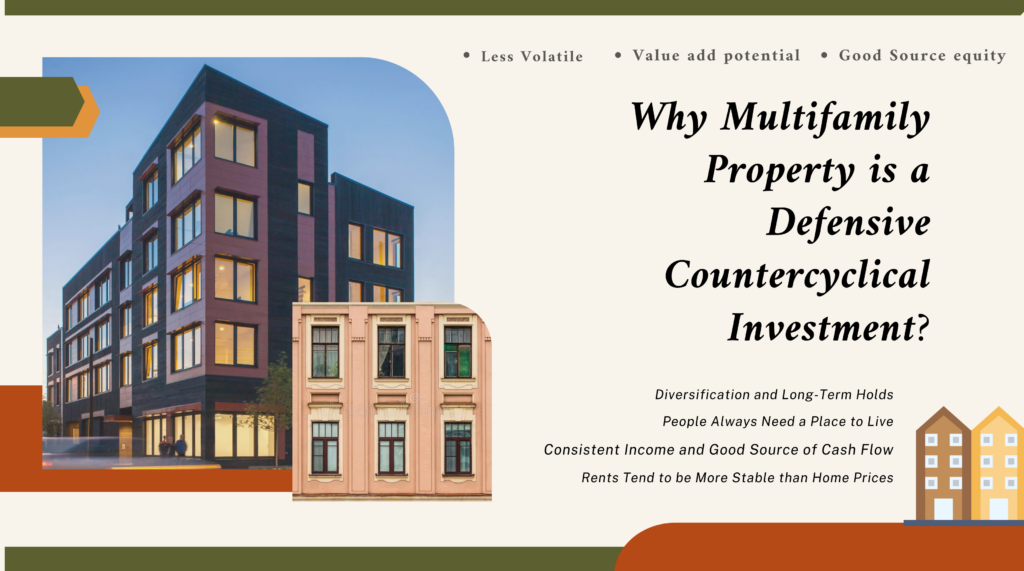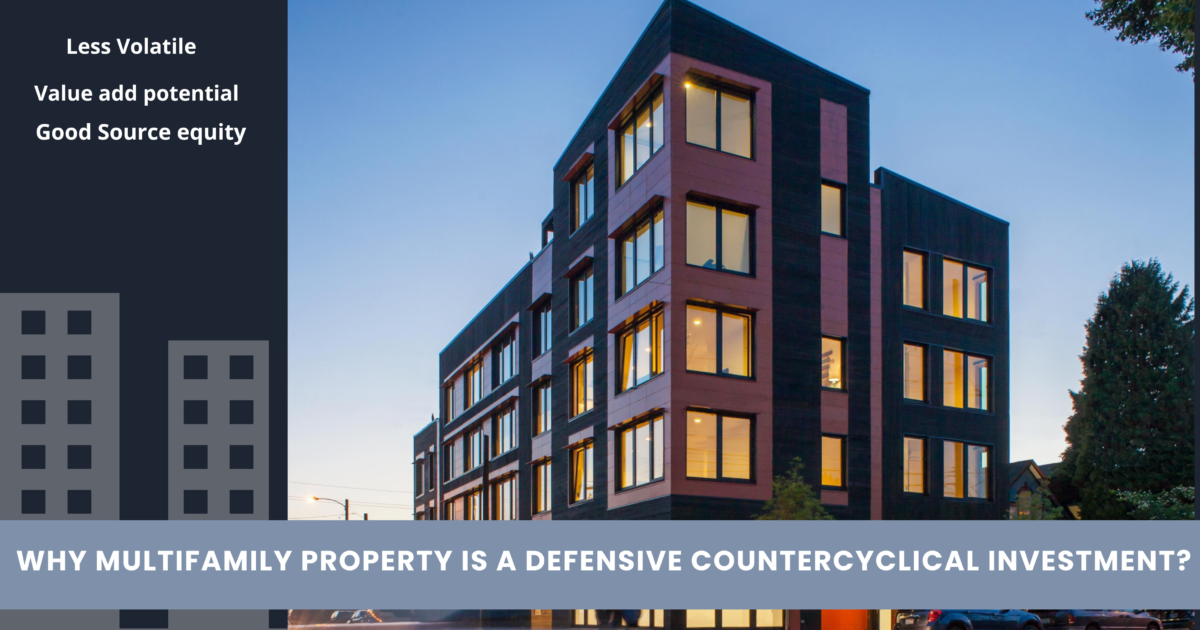As an investor, you’re always looking for opportunities to grow your portfolio and generate revenue. At the same time, you also want to protect your investment. This is why you need to diversify your portfolio with defensive investments. As we all know, the housing market is constantly fluctuating. This is a good thing for some, allowing them to buy low and sell high. For others, it’s a nightmare as they helplessly watch their investment plummet in value.
However, one type of investment seems to do well in both good times and bad: multifamily apartment buildings. When it comes to investment opportunities, multifamily properties tend to be overlooked in favor of other options. The multifamily property is a defensive countercyclical investment as it’s less volatile than other investments. It also has a strong history of outperforming the stock market during economic downturns. Multifamily property is a much safer investment in a world of volatile markets and uncertain economic conditions.
What are Countercyclical Defensive Investments?
By definition, countercyclical investments are those that tend to perform well when the overall economy is weak, and the multifamily apartment buildings fit that bill. In simple terms, it means that when the economy is going through a tough time, multifamily properties can help buffer against some adverse effects. Apartment buildings, in particular, have been among the most stable and profitable types of real estate over the past decade. Apartment complexes typically have higher NOI than single-family homes, making them a more reliable and stable investment.
Despite the current economy, multifamily housing remains a popular choice for investors. With economies of scale, tax benefits, and alleviated risk, multifamily investments offer cash flow to the passive investor without the hands-on management and demands of single-family investments.
Whether you’re looking for a long-term investment or a more speculative play, multifamily properties offer a variety of opportunities. You can make a wise choice for your portfolio with careful analysis and sound judgment.

How Multifamily Property is a Defensive Countercyclical Investment?
Let’s take a look at some of the reasons why multifamily apartments are a defensive countercyclical investment:
I. Diversification and Long-Term Holds
One of the key benefits of investing in multifamily properties is diversification. By diversifying your portfolio with multifamily properties, you can help to reduce your overall risk. They also tend to be long-term holds. This means that you can hold onto the property for a longer period, which can help ride out any economic downturns.
II. Consistent Income and Good Source of Cash Flow
Unlike other investments multifamily real estate can provide a more consistent income stream. This is because tenants tend to stay longer in multifamily properties than in other types of properties. This makes them a good source of cash flow. This is especially important during economic downturns when other assets may not be performing well.
In other words, when you own a multifamily property, you can generate rental income that can help you weather a recession. If you are smart about it, you can even use that income to help you pay down the mortgage on your property. So, you can generate income from your multifamily apartment building in a recession and use that income to help you pay down the mortgage. That’s a pretty good deal.
III. Less Volatile
Multifamily properties are also generally less volatile than other types of investments. This means that they can provide a steadier return over time, which can be helpful during periods of economic turmoil. In general, multifamily real estate is less volatile than other investments. That’s because, as we mentioned before, people always need a place to live. For example, people don’t stop renting apartments when the stock market crashes. They may move to a cheaper apartment but still need a place to live.
IV. Value-Add Potential
Multifamily real estate also offer the potential for value-add investments. You can add value to the property through renovations or other improvements, which can make the property more valuable in the long run. While the multifamily property is a defensive investment, it also offers potential for appreciation. This is because people are more likely to move into nicer apartments and pay higher rent as the economy improves.
V. Good Source of Equity
Multifamily real estate can be a good source of equity. In other words, when you own a multifamily apartment building, you can use the equity in your property to help you weather a recession. And, if you are smart about it, you can even use that equity to help you buy more multifamily real estate. So, not only can you generate income from your multifamily property in a recession, but you can also use the equity in your property to help you buy more multifamily properties.
VI. Historically Outperformed Stock Markets During Recession
Multifamily real estate has a long record of being a recession-resistant asset class that prospers in both good times and bad. Historical data shows that multifamily apartments have outshone the stock market during economic downturns as an asset class. The stats have shown that over any period greater than one year, multifamily has provided better risk-adjusted returns than any other real estate asset class. (Source: NMHC, Explaining the Puzzle of High Apartment Returns.)
VII. Rents Tend to be More Stable than Home Prices
Another reason why the multifamily property is an excellent defensive investment is that rents tend to be more stable than home prices. In other terms, when the economy is struggling and home prices are falling, rents generally don’t fall by as much. So, while the value of your multifamily apartment building may go down in a recession, the amount of rent you are able to charge is likely to stay relatively stable.
VIII. People Always Need a Place to Live
Lastly, No matter the economy’s state, people will always need a place to live. That’s just a fact of life. And, when the economy is struggling, people are even more likely to rent rather than buy a home. That’s because, when times are tough, people are generally more conservative with their money and don’t want to tie up all of their cash in a big purchase like a home. So, when the economy is struggling, there is generally high demand for rental properties. And, that’s good news for investors in multifamily properties.
Conclusion
As you can see, there are a number of reasons why the multifamily property is a defensive countercyclical investment. If you’re looking for an investment that can help you weather the storm during tough economic times, multifamily property is definitely worth considering.
